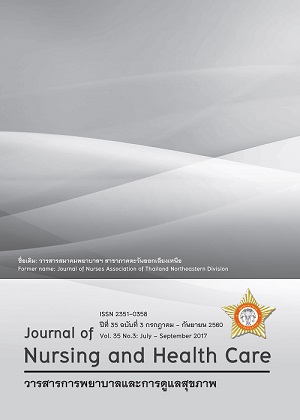ความผาสุกทางจิตวิญญาณของผู้สูงอายุโรคเรื้อรังในชุมชน The Spiritual Well-Being Among Thai Older People with Chronic Illness Dwelling in Community
คำสำคัญ:
ความผาสุกทางจิตวิญญาณ, ผู้สูงอายุโรคเรื้อรัง Spiritual well-being, Thai older people with chronic illnessบทคัดย่อ
บทคัดย่อ
การวิจัยเชิงพรรณนาครั้งนี้ มีวัตถุประสงค์เพื่อศึกษาระดับความผาสุกทางจิตวิญญาณของผู้สูงอายุโรคเรื้อรังในชุมชน โดยใช้กรอบแนวคิดความผาสุกทางจิตวิญญาณที่พัฒนาจากพุทธศาสนา ตามวัฒนธรรม ความเชื่อ และบริบทของสังคมไทย ประชากรคือ ผู้สูงอายุโรคเรื้อรัง ตำบลบ้านต๋อม อำเภอเมือง จังหวัดพะเยา กลุ่มตัวอย่างมีจำนวน 320 คน ใช้วิธีการสุ่มแบบหลายขั้นตอน เก็บข้อมูลโดยใช้แบบวัดความผาสุกทางจิตวิญญาณ มีค่าความเชื่อมั่น 0.81 วิเคราะห์ข้อมูลโดยใช้สถิติเชิงพรรณนา ผลการศึกษาพบว่า ระดับความผาสุกทางจิตวิญญาณของกลุ่มตัวอย่างโดยภาพรวมอยู่ในระดับสูง ร้อยละ 92.2 เมื่อพิจารณาเป็นรายด้านพบว่าด้านความสุขสงบ ด้านการมีความหวังและความรู้สึกถึงการมีสิ่งยึดเหนี่ยว และด้านความเข้าใจตนเองและธรรมชาติของชีวิต อยู่ในระดับสูง ร้อยละ 88.1, 88.1 และ 86.2 ตามลำดับ
ผลการศึกษาที่ได้จะเป็นแนวทางให้กับบุคลากรในระบบสุขภาพและองค์กรส่วนท้องถิ่น นำไปใช้เป็นข้อมูลในการส่งเสริมความผาสุกทางจิตวิญญาณที่เหมาะสมสำหรับผู้สูงอายุโรคเรื้อรังในชุมชน เพื่อให้ผู้สูงอายุโรคเรื้อรังในชุมชนบ้านต๋อม มีคุณภาพชีวิตที่ดีและมีความผาสุกในการดำเนินชีวิตต่อไป
Abstract
This descriptive study aimed to investigate spiritual well-being levels of community-dwelling older people with chronic illness. Spiritual well-being concept based on Buddhism, culture, beliefs and contexts of Thai people was used as conceptual framework of this study. Population were older people with chronic illness who lived in Tambon Ban Tom, Muang, Phayao province. Sample were 320 older people with chronic illness selected by multi-stage sampling. The research instrument was The Spiritual Well-being Scale for Thai Buddhist Adults with Chronic Illness. Data were analyzed using descriptive statistics, percentile, mean and standard deviation.
The results of this study revealed that, overall, the participants' spiritual well-being was at a high level (92.2%). For all three components of spiritual well-being, it was shown that components of hope and sense of connectedness, happiness, and self-understanding and nature of life were at a high level (88.1%, 88.1% and 86.2% respectively). The result from this study would be used to guide the health care providers and the local government organization enhancing the spiritual well-being in order to improve the good quality of life for older people with chronic illness in Ban Tom.


